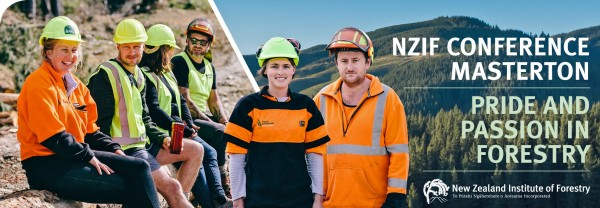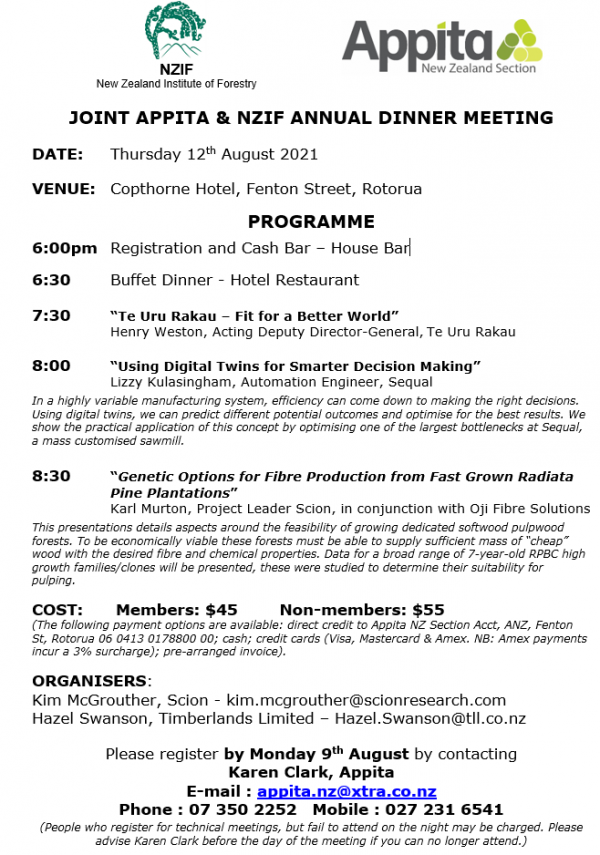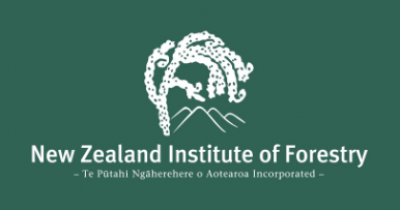12th July 2021 newsletter
PRESIDENTS COLUMN

Last week I was sent an email which originated from a member and was critical of NZIF leadership around the ETS. The email implied we were supportive of the ETS and its complexity. While I do not wish to comment on the email it raised a concern I and the council have had for a while now; that being we are not getting our messaging out clearly to members. If we were; the author of the above email would know NZIF in fact submitted against the ETS, proposing a carbon tax instead, and has consistently submitted against the increasing complexity of the ETS.
At the council meeting last week, council pondered how we should communicate with members and how we could improve. We have this newsletter, which we use to give updates on key NZIF matters as well as to encourage debate amongst members. I strongly believe robust debate by members amongst members can only be good for improving the knowledge of all members. As such I work hard to encourage debate via the member voice section of this newsletter, often playing devils advocate to try to get comments and debate flowing.
We also have the NZ Journal of Forestry, which is published quarterly. The Journal is used to pass on learnings to members around forestry science, and also includes an opinion piece occasionally. Outside of these formats we have local section meetings (some are more active than others), CPD sessions, the annual conference and the AGM and annual report.
My questions for members are; are we communicating enough? Do you feel you know what your council is doing and are we representing you well? Would you like additional communication in another format, if so what and how often? What is your preferred method of receiving communication? Finally what do you want to hear about? Please feel free to email me directly with your thoughts, or even better send them to Raewyn as a members voice so we can encourage some debate around this.
During the council meeting, council held a discussion around meetings and the difference between Governance and Management. This has been an ongoing issue for council for as long as I can remember. As such we have decided to hold full council meetings face to face quarterly. Councillors with key management responsibilities will hold smaller ‘management’ meetings as required, but at least once a year. These meetings may include non council members and the goal will be to set and implement strategy for the responsible area. These management meetings will include: local sections, membership, submissions, journal, fire, valuations, fellows, future foresters, women in forestry. Many of these groups are already meeting outside of council. If you are interested in getting involved in any of these areas please let Raewyn know and she will put you in contact with the councillor in charge.
Finally I would like to acknowledge the sad news of the passing of Grant Duffy who died suddenly a few weeks back. Whilst not a member, Grant in his role at Worksafe was a beacon of common sense and worked tirelessly to ensure everyone in our industry was safe, while at the same time ensuring his bosses understood the complexities of forestry. Personally I worked alongside Grant helping set up Safetree, and his calm manner, good advice and counsel helped immensely. He will be sadly missed by all of us.
I wish you all a safe and enjoyable week.
Thanks
James
MEMBERS VOICE
Members Voice
I 100% agree with Peter Clarks thoughts on domestic processing.
Anyone wanting to establish a world scale processing operation had better look very carefully at the wood availability going forward – there is very limited regions where you would be brave enough to spend the dollars required now to build a world scale plant. Add in Carbon, biomass, biofuels etc demand that the Climate Change Commission and industry outside now see or want and its investor beware.
Next add in increasing environmental control (Im not saying its wrong!!) and we can see many areas currently being harvested not being in the future.
Throw in the fact that a lot of provincial regions will experience a 20 – 30% plus decline in working age populations in the next 10 to 20 years - this is programmed in not maybe – migration will not move this fact I’m afraid.
We all need, and want, a vibrant and profitable processing sector but the future form of that maybe quite different going forward with a lot of competing demands for wood fibre/forest that we have not seen in the past.
In my eyes Log export to Asia is simply an aggregation of supply to one point to get scale. Its far cheaper to freight the logs to Asia than try and aggregate them in one place in NZ for a couple of processing plants. If we want to succeed in world scale processing it will have to be in higher value products as Peter outlined or limited to regions that do have enough consistent wood supply and labour.
Regards
Dave Janett
CONFERENCE
NZIF 2021 CONFERENCE
27th to 29th June 2021 has been Postponed due to Covid 19, the new conference dates are 15th/16th and 17th August. Same venue, programme etc.
Copthorne Hotel & Resort Solway Park
High Street
Masterton
Please see the link below for conference programme. If you would like to book, please contact Raewyn at admin@nzif.org.nz with details of what you would like to attend.
INSTITUTE UPDATE
Tribute to John Gleed - The English Gentleman and Champion of New Zealand Tree Improvement
I first met John Gleed as a young Fletcher Timber forester. I was sent one August winter morning in 1978 to pick up seedlings from the then Tasman Pulp and Paper Company tree nursery in Te Teko. Little did I know that just three years later I would be working with John. As he tirelessly championed bringing the very best global forest genetics and tree improvement to the newly formed Tasman Forestry. John was an early advocate of investing in commercial scale seed orchards applying in the field the incredible tree improvement research and genetics programs of the NZ Forest Research Institute and later Tasman Forestry. Even at this time John was dedicated to hiring, engaging and listening to bright minds. No surprise then that John pioneered or fostered numerous major innovations in Radiata Pine tree improvement. Including the propagation of field cuttings, tissue culture propagation and clonal forest management. Culminating in early genetic fingerprinting to foster early clone selections.
To John, tree improvement was never research. It was and remains a long running productivity race. Like his friends Drs. Zobel, Shelbourne, Nichols, Libby and Carson his greatest gift to our industry was his mentoring and nurturing of staff at Fletcher’s. Others Included Darling, Arnold, and Sayer to name just a few. Together with his Te Teko team this urbane Englishmen forever dressed in his tweed sport coat changed the very course of Radiata Pine tree improvement globally.
I too want to thank you John for the endless debates about the economics of tree improvement over cups of tea at Te Teko. You made me such a better forester and silviculturist through the times I spent with you. While it has been decades since last visiting with John and Betty; his teachings and accomplishments remain ever near at heart.
David New
Former Tasman Forestry Forester
Past Member NZIF
NZIF Administrator
Email: NZIF Office
Mobile: +64 22 653 3750
NZIF Registration Board
Email: Registrations
Mobile: +64 27 463 1118
Complaints
Email: Complaints
Appeals
Email: Appeals
© All rights reserved. No part of this site may be reproduced, adapted, or distributed without prior written permission
We are a forum to exchange ideas, opinions and information about forestry.
We encourage and help our members attain and maintain the highest standards of their profession.






